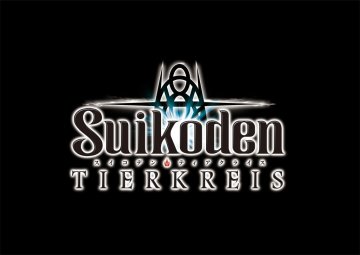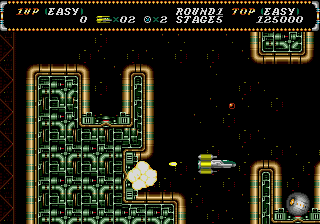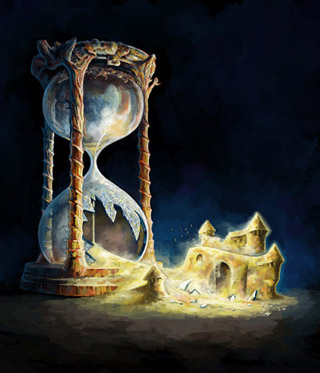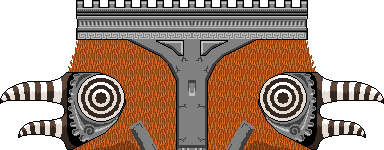Making Mirror’s Edge

Yet another “behind the scenes”-piece on Mirror’s Edge is available on 1up; Nothing new or tremendously interesting (apart maybe from the pitch video), but the game itself is still interesting enough to warrant additional coverage. I like how they mention sticking religiously to the core mechanic as key to their (projected) success, like Jonathan Blow did with Braid awhile back. Sure, it’s not as simple as that as you need a very strong core mechanic to begin with, but it’s always nice to hear that innovative gameplay can still be the most important thing even in a large-scale commercial game.
Suikoden: Tierkreis Announced

New entries in the Suikoden series of games have had a permanent spot on my list of most anticipated games ever since Suikoden 2. There’s just so much to like about them; the coherent world and recurring characters, the interesting take on RPG battles, the wealth of extra material and minigames and – what is most important for me personally – the atmosphere and story that always revolves around opposing forces, moral positions and never simply “good versus evil”.
It’s been disturbingly quiet from Konami since the release of Suikoden V, but yesterday Suikoden: Tierkreis was announced. I’m not too enthusiastic about the online stuff since in the past similar promises had led to Konami neglecting the core of the game, but at this point any news is cause for celebration.
On Difficulty Levels

Daniel Boutros writes an article about how to properly implement difficulty levels in games, nothing revolutionary but a solid summary of some things to think about when adjusting the difficulty of a game.
I am personally past the point where I would willingly choose to play a game on a harder setting for no reward other than the knowledge that I beat it (with some exceptions), but providing a difficulty setting is really the least you can do to broaden a game’s target audience.
What women want from games
While the gender differences concerning game-players in general are small to negligible, anyone can tell you that the “heavier” console and PC titles are enjoyed by men to a much larger extent than women. Journalist Leigh Alexander wrote a piece about why this is, and theorizes that while content has got something to do with it, the big issue is just the fact that “anyone can tell you that”. Not earth-shattering news, maybe, but I have never seen someone put it so eloquently before. In Sweden, where it is usually hard to get anyone admit to playing videogames, this seems especially true – while female gamers are hard to find, at least the ones I know have delightfully unpredictable tastes.
But enough rambling from me about things that I haven’t got a clue about. World of Goo has gone gold! Congrats Ron and Kyle! Now send me my copy!
Braid

Jonathan Blow seems to divide the gaming world in one group that thinks he’s a messiah and another that just think he’s a complaining loudmouth. I personally think he qualifies for both groups based on which interview/column/presentation of his you read, but even those who dislike him fully don’t neglect that his game Braid is something special.
Braid is a puzzle-based platform game centered around manipulating time; In a way you could say it is to time-based puzzles what Mario Galaxy was to gravity-based gameplay – it has been touched upon before but no game revolves around it to this extent and does it so well. You control the character Tim that can rewind time indefinitely to solve puzzles, along the way you reach new ares where doing so has different secondary effects that you need to use to solve puzzles. It actually reminds me a lot of Logigun in the gameplay, progression model with new skills and in the sense that the solution is never obvious at first and while sometimes you might think you need quick reflexes this is only because you have yet to find the correct way of tackling the puzzle.
Blow likes to say that Braid doesn’t compromise and contains no fillers; and while this is a claim people usually don’t live up to it’s mostly true. All of the puzzles have some unique challenge about them and since you can rewind time as much as you want, there are very few places where you actually have to restart a level when you realize you have made a mistake. This makes the game rather short, but I assume Blow’s target audience prefers condensed fun; I certainly do.
Presentation-wise, Braid really stands out as David Hellman‘s graphics manage to look like a moving, living painting without compromising the clarity of the game components, it looks good in screenshots but is really stunning in motion. The sound and music sets the mood quite well and helps keeping you immersed by following the strange movements of time in the game, although this can become slightly annoying at times. Braid also has a rather nice story although it is only told in text segments between the levels and is mostly disconnected both from the gameplay and the audiovisual style.
The same year Aquaria took home the IGF grand prize, Braid took the Design Innovation award and having played both I have to admit this makes a lot of sense. The games themselves are not very similar but their respective development processes more so; both of them had most of the development done by two people. Granted, development time was long and budgets were very large for two-man projects, but it’s always nice to see that there’s room in the games industry for really small teams to make really good commercial games.
Phoenix Wright: Ace Attorney: Trials and Tribulations

It’s been more than a week since I completed the game (and almost a year since I played the first couple of cases), so I don’t have much to say about it – actually, there isn’t much to say since it is very much a continuation of the earlier parts in the series. You still play the defense attorney Phoenix Wright tasked with defending the innocent people accused of murder by playing an adventure game to look for evidence and then using this evidence to show who’s lying and how the real murder actually happened.
As with the other games in the series, the strength of the game lies in the vivid characters, and the big weakness is the linear structure of the problem-solving. While it sometimes work okay, most of the time you’re a few steps ahead of the action and already know how the murder occurred, but the steps to prove it are illogical. It is also annoyingly inconsistent with how you are allowed to use testimony, cross-examinations and evidence so a lot of times you’re just trying using trial-and-error to try and figure out what rules the game is playing by. Then again, this is a rather common problem for adventure games and since the Phoenix Wright series is just that and not some kind of simulator, it can be expected.
Most of the time, Trials and Tribulations is a good game, albeit not sensational, but it becomes tedious a few too many times.
Aether

Edmund McMillen, one of the creators of the awesome 2005 IGF winner Gish, brings us a short demo of the surreal game Aether that he’s currently developing…
Edmund says it’s a very personal project and while it’s rather short and the gameplay is straightforward (so far), it is a very soothing game to play and I am really looking forward to seeing where he is going with this.
Shadow of the Bossus v.1.0

My game for the TIGSource Bootleg Demakes competition is now officially finished, I won’t rule out the possibility that I’ll keep working on it at some point although the chances are slim. I mostly did it to try out my engine, after all, and I don’t expect to do very well in the compo seeing as the other games are looking real sharp. I’ll try to test as many as I can, although I’m not sure how much time I will have to do so.
Working with the engine proved to be a pleasure on some points, and a pain on others. The pains were mostly from working with areas I have yet to implement properly, but also from struggling to wrap my head around the new fancy structure I opted to use – in the end, I didn’t really use it the way it should be used, but I guess I did learn that.
I’ve been away on vacation for the last week (and finished some DS games, more on that during the week), so updates have been sparse. They will likely continue to be due to said lack of time.